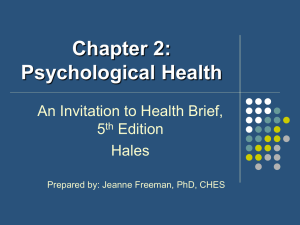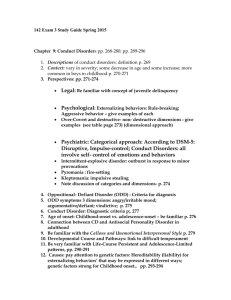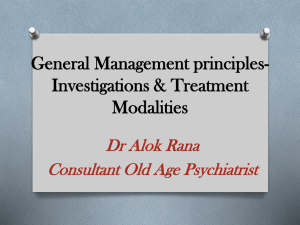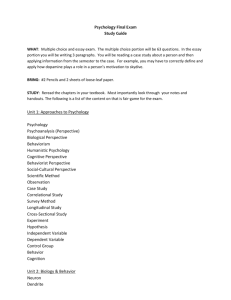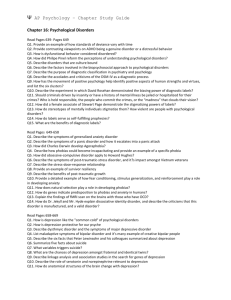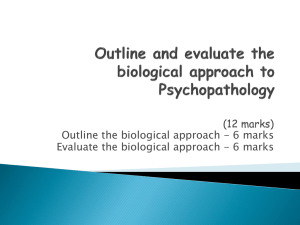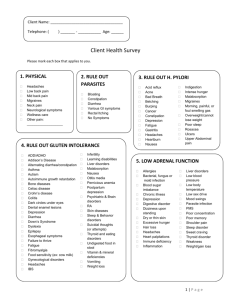Lecture 13
advertisement
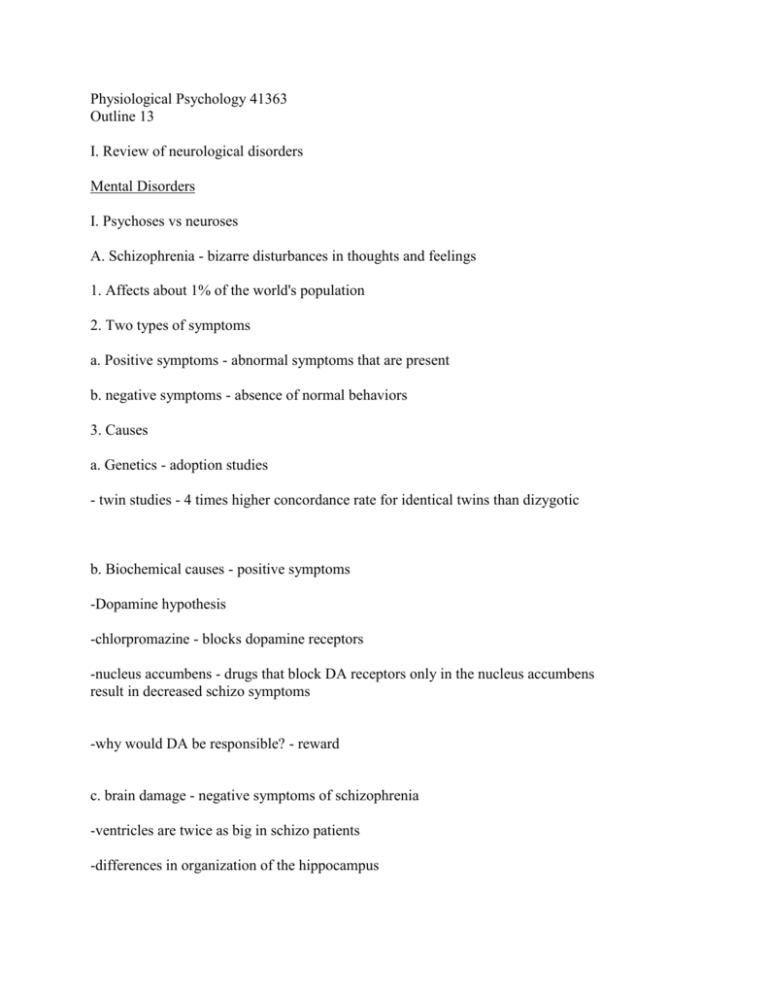
Physiological Psychology 41363 Outline 13 I. Review of neurological disorders Mental Disorders I. Psychoses vs neuroses A. Schizophrenia - bizarre disturbances in thoughts and feelings 1. Affects about 1% of the world's population 2. Two types of symptoms a. Positive symptoms - abnormal symptoms that are present b. negative symptoms - absence of normal behaviors 3. Causes a. Genetics - adoption studies - twin studies - 4 times higher concordance rate for identical twins than dizygotic b. Biochemical causes - positive symptoms -Dopamine hypothesis -chlorpromazine - blocks dopamine receptors -nucleus accumbens - drugs that block DA receptors only in the nucleus accumbens result in decreased schizo symptoms -why would DA be responsible? - reward c. brain damage - negative symptoms of schizophrenia -ventricles are twice as big in schizo patients -differences in organization of the hippocampus -what causes the brain damage -virally induced: -latitude effect -seasonality effect B. Major affective disorders - feelings of mania or depression that are not justified by events in their lives 1. types of depression -reactive - following an event that saddens us -endogenous - intrinsic characteristic 2. Two types of major affective disorders a. bipolar disorder - alternating periods of mania and depression - mania lasts usually days to weeks and then the periods of depression last months: equal numbers of men and women b. unipolar depression - unremitting or episodic: 2 to 3 times more common in women - risk of death by suicide: 10% of depressed individuals commit suicide -lower concentrations of serotonin in the brain and higher levels of circulating cortisol 3. Genetics - concordance rate of monozygotic twins is 69% while for dizygotic is only 13% 4. Treatments a. monoamine oxidase inhibitors - MAO inhibitors: -monoamine hypothesis of depression - focus on NE and serotonin b. tricyclic antidepressants - inhibit the reuptake of serotonin and NE by terminal buttons c. electroconvulsive therapy (ECT) - has very rapid effects d. lithium - used to treat bipolar disorder - very rapid: works best when administered during a manic phase 5. Depression and sleep a. difficulty falling asleep: decreased slow wave sleep: earlier REM period b. treating depression with sleep deprivation 1.total sleep deprivation - immediate increases in mood for about 2/3 of all depressives 2. partial sleep deprivation - selective deprivation of REM sleep c. seasonal affective disorder - treated with phototherapy - might act through melatonin 6. Depression and the HPA axis -high levels of cortisol have also been found in hospitalized depressed patients: -dexamethasone suppression test C. Anxiety disorders persistent unrealistic and unfounded fear 1. Panic disorder - 1-2% of the population and twice as many women as men -anticipatory anxiety can lead to agoraphobia -causes - some hereditary evidence: can be triggered with injections of lactic acid or breathing carbon dioxide -treated with benzodiazepine 2. Obsessive compulsive disorder -obsessions - inappropriate thoughts that will not leave -compulsions - inappropriate behaviors that you can't keep from performing -1-2% of the population and females are slightly more likely to have a. causes - some genetic evidence - associated with Tourette's syndrome -damage to the basal ganglia and the areas around the cingulate gyrus and the prefrontal cortex b. treatment -knocking out the cingulate bundle -serotonin agonists: blockers of 5-HT reuptake
